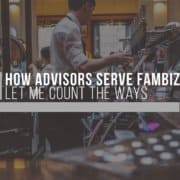Figuring Out Who Belongs Where
Working with families who are in the early stages of trying to establish some governance, there are always many areas of uncertainty involved, and some doubts about just how to proceed.
Often families expect that the steps and answers will be simple and easy to follow, but that’s rarely the case in my experience.
And that’s actually a good thing, because every family is different, and you can’t just look at a similar family who are a decade ahead of you and assume you can copy them and save ten years of work.
Of course there are likely plenty of experts who will try to tell you that it’s doable and charge you a hefty price for the shortcut, and some of you will buy into the mirage, unfortunately.
Regular Family Meetings Come in Many Forms
One good place for me to begin sharing my views on this subject is to look at a couple of the most basic kinds of meetings and structures that many families use to form key parts of their family governance: the family assembly, and the family council.
Regular readers will recognize my penchant for wordplay, and the title of this post definitely went there, as I found a way to (cleverly?) combine both of those into my headline, and ended up with more than I bargained for.
While a “family assembly” is a popular term for what many families create, the “some assembly required” does double duty in underscoring how much work is typically required when a family goes down the road to creating their governance structures and procedures, which must evolve slowly over time to actually have a high probability of success over the long haul.
From a Large Group to a Small One?
But not every family evolves in the same direction, as I will now discuss.
Sometimes a family will begin by having a large gathering, where everyone who’s related is invited to spend some time together, often like a reunion, and where the festivities might last longer than one day.
If those are the characteristics, then I would put that under the heading of a family assembly.
This is usually the largest and most inclusive group of people invited to get together, and includes many possible stakeholders, including in-laws, and many who will never work in or own any part of the family enterprise.
At some point down the road, such a family may decide to convene an smaller, more select group of family members who can then make some decisions for the family.
From a Small Group to a Large One?
Other times a small group is the starting point, where a select few, carefully chosen family members come together and begin to make some important decisions that affect the family and how its members interact with the family’s enterprise(s).
They may begin to make some major strategic decisions that start to form the building blocks of the family’s governance.
This approach is one I would label a family council.
At some point, this group might decide that a much larger meeting would be useful to share information and educate a larger group of family stakeholders, and they might decide to hold such a gathering, which may then become something that also reoccurs on a regular basis.
Neither Is Necessarily Better or Worse
Last week in Looking Forward Together as an Enterprising Family, I ended by noting that the most important idea is to get into the habit of having regularly scheduled family meetings.
I did not get into whether those meetings might be an annual family assembly or a quarterly family council meeting, because either one might make the most sense for any particular family at any point in time.
All of this, no matter which direction it goes, requires some leadership and intentionality.
Writing about this has just sparked my memory of a favourite quote of mine, which I have yet to share in a blog post, so here goes.
From Arthur Ashe
Arthur Ashe was an American tennis player who faced plenty of adversity. Here are his wise words:
“Start where you are.
Use what you have.
Do what you can.”
I love the simplicity of those words, and they apply quite nicely to any family beginning their family governance journey.
They can also come in handy in a variety of other life situations, so make sure they’re never far away whenever you need them!










